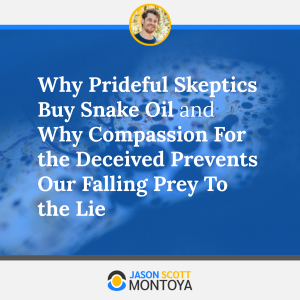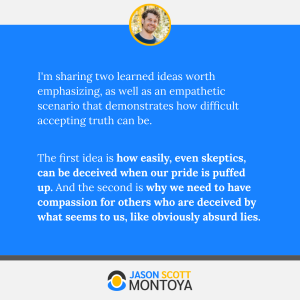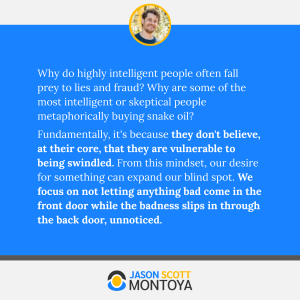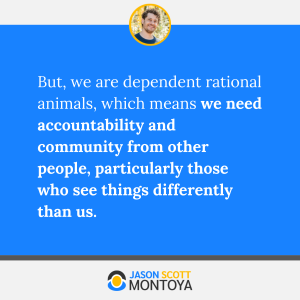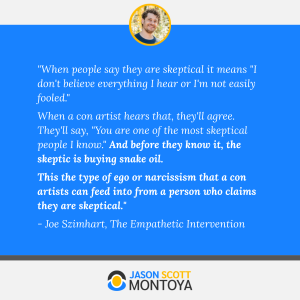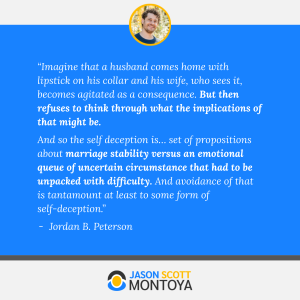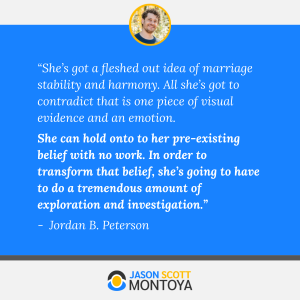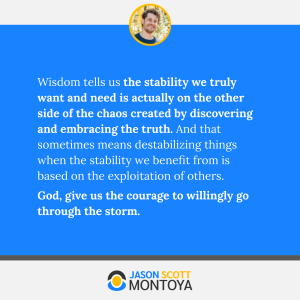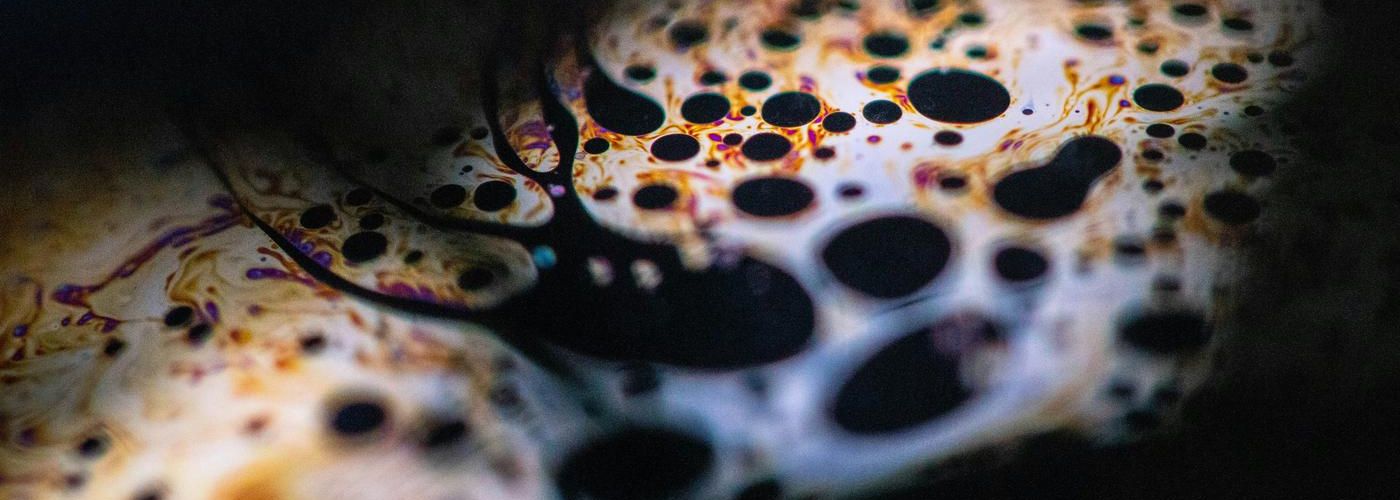
Why Prideful Skeptics Buy Snake Oil and Why Compassion For the Deceived Prevents Our Falling Prey To the Lie
The last several years have been an extensive learning experience for me on the spiritual and societal layers of life as I've navigated how to reach and help friends and family falling prey to deception. And I've learned a great deal rooting out my own self-deception and blind spots.
In this post, I'm sharing two of these learned ideas worth emphasizing, as well as an empathetic scenario that demonstrates how difficult accepting truth can be.
The first idea is how easily, even skeptics, can be deceived when our pride is puffed up. And the second is why we need to have compassion for others who are deceived by what seems to us, like obviously absurd lies.
These two insights are two tools to help us find the truth and protect ourselves.
Deceived Skeptics
Stuart Ullman: I don't suppose they told you anything in Denver about the tragedy we had in the Winter of 1970.
Jack Torrance: I don't believe they did.
Stuart Ullman: My predecessor in this job left a man named Charles Grady as the Winter caretaker. And he came up here with his wife and two little girls, I think were eight and ten. And he had a good employment record, good references, and from what I've been told he seemed like a completely normal individual. But at some point during the winter, he must have suffered some kind of a complete mental breakdown. He ran amuck and killed his family with an axe. Stacked them neatly in one of the rooms in the West wing and then he, he put both barrels of a shot gun in his mouth.
Jack Torrance: Well you can rest assured, Mr. Ullman, that's not going to happen with me.
The Shining, 1980
Why do highly intelligent people often fall prey to lies and fraud?
Why are some of the most intelligent or skeptical people metaphorically buying snake oil?
Fundamentally, it's because they don't believe, at their core, that they are vulnerable to being swindled. From this mindset, our desire for something can expand our blind spot. We focus on not letting anything bad come in the front door while the badness slips in through the back door, unnoticed.
When we fail to seriously consider the possibility that we could be wrong or that we are missing something fundamentally important, we're at risk.
This gap we can hold open is an extension of an autonomy mindset, where we think we can navigate the discovery of truth on our own.
But, we are dependent rational animals, which means we need accountability and community from other people, particularly those who see things differently than us.
In my journey to understand self-deception, I stumbled upon the great work of many leaders who are helping people out of cults. Joe Szimhart is one of them.
Here's what he said in an interview about the skeptic and where I originally garnered this lesson.
"There is someone who knows how to apply skepticism properly. That's different than being a skeptical person. When people say they are skeptical it means "I don't believe everything I hear or I'm not easily fooled." When a con artist hears that, they'll agree. They'll say, "You are one of the most skeptical people I know." And before they know it, the skeptic is buying snake oil. This the type of ego or narcissism that a con artists can feed into from a person who claims they are skeptical." - Joe Szimhart, The Empathetic Intervention
This insight was so striking when I first heard it because I've watched it firsthand over and over. Our pride and selfishness lead us and others astray!
“The essence of a successful hoax was that it presented scientists with what they expected to see.” - Michael Crichton, Jurassic Park
A simplistic mindset is no match for someone who knows how to exploit our vulnerabilities.
We can certainly work on shoring up our blind spots, but the healthier more robust option is embracing our dependence by participating in community and accountability. The healthiest forms of this would include people who will tell us the things we don't want to hear when it matters most.
For us to embrace this idea requires that we fully embrace our fallibility and dependence on rationality to the reasoning that's based on community.
Alasdair Macintyre emphasizes this point in his book, Dependent Rational Animals (affiliate link).
"From the standpoint of the virtues of acknowledged dependence, as we have already seen, we need friendships in which each goes to the aid of the other, friendships that endure over time, in peace and war, at work and at leisure, in health and in pain, sickness, and disability."
Compassion For the Deceived
Compassion for the deceived is tough, especially when the consequences of their deception affect other people, including ourselves.
But when we recognize that we have been, and likely in some part of our life now, are now deceived, it can help us reframe the dynamic so that we can have compassion for those under the spell of deception.
So, this is a reminder of our own fallibility so that we see the brokenness of others through that perspective. Alan Jacobs captures this powerfully as follows.
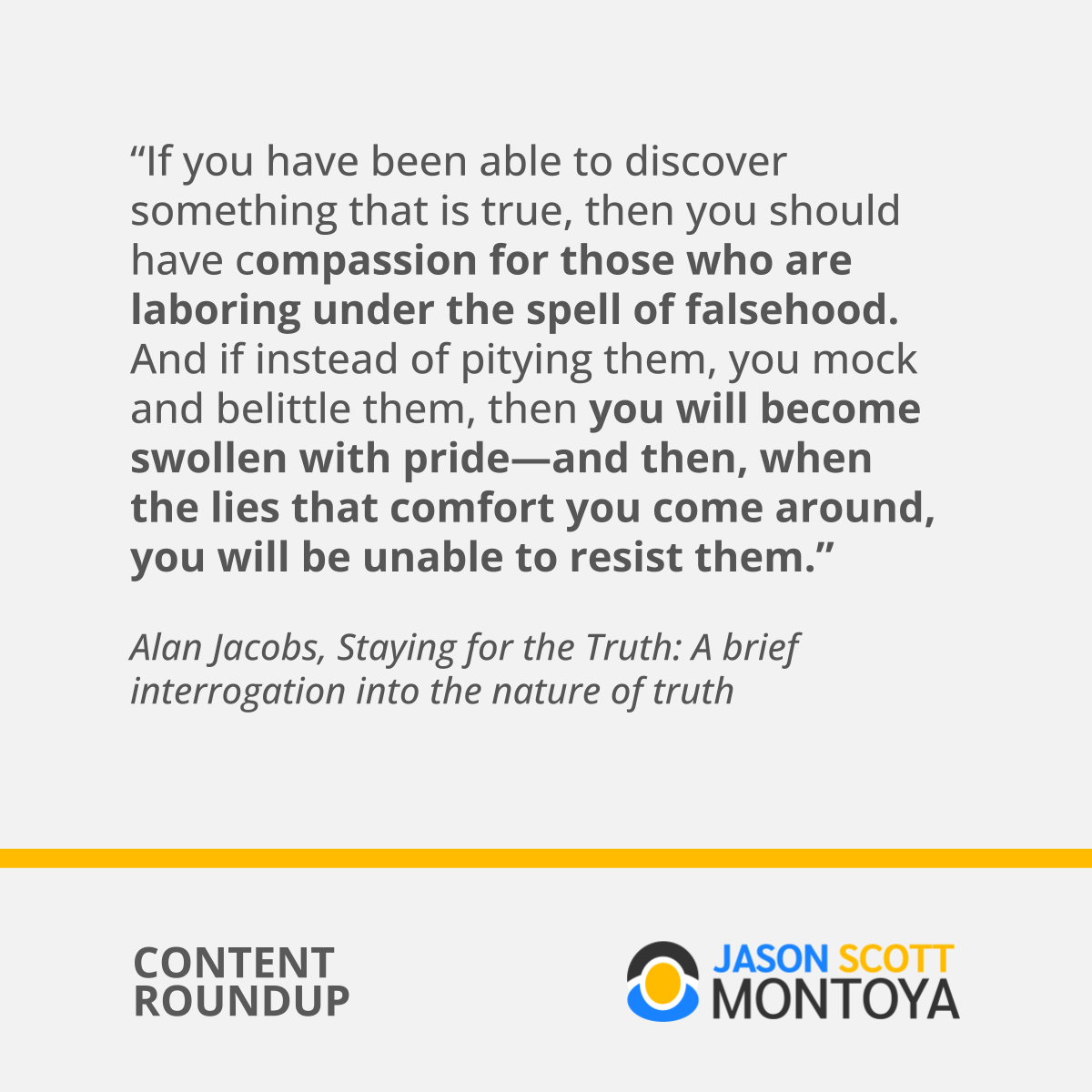
"If you have been able to discover something that is true, then you should have compassion for those who are laboring under the spell of falsehood. And if instead of pitying them, you mock and belittle them, then you will become swollen with pride—and then, when the lies that comfort you come around, you will be unable to resist them." - Alan Jacobs, Staying for the Truth: A brief interrogation into the nature of truth
Based on our appreciation of this future possibility of being deceived, lets us remember to have compassion for those under a lie we've rejected. And often, that compassion will need to be directed at ourselves, because it's unlikely we've personally purged all of our self deception.
This place of humility will not only protect us, but more effectively reach those, under the lie, with the truth.
The Difficulty of Accepting Reality & Challenging Our Illusion
Some truths can often be devastating. This can be more salient, the further entrenched with the lie, we become.
In an interview with self-deception expert Robert Trivers, Jordan Peterson shares the following difficult infidelity scenario that powerfully encapsulates this issue.
“Imagine that a husband comes home with lipstick on his collar and his wife, who sees it, becomes agitated as a consequence. But then refuses to think through what the implications of that might be. And so the self deception is not one fully thought out proposition against another. It’s a fully thought out (or partially thought out) set of propositions about marriage stability versus an emotional queue of uncertain circumstance that had to be unpacked with difficulty. And avoidance of that is tantamount at least to some form of self-deception.
She’s got a fleshed out idea of marriage stability and harmony. All she’s got to contradict that is one piece of visual evidence and an emotion. She can hold onto to her pre-existing belief with no work. In order to transform that belief, she’s going to have to do a tremendous amount of exploration and investigation.”
These are the most difficult of situations that can drive us the furthest into self-deception.
Reading that scenario gives me a visceral feeling of dread and difficulty. It also reminds me of all the times I've failed by ignoring or dismissing the signs.
If we like our life, and we face this type of tension from a possible life-changing situation, we're inclined not to disrupt our way of life to do the hard work and discover the truth.
Stability is a wonderful thing. Embracing the chaos that comes with the disruption is scary.
The illusion is believing that the shaky situation we're in won't continue or get worse when we ignore it. This is the type of toxicity that can enable and empower it to get worse. Here again, I'm guilty of failing at this way too many times than I'm comfortable admitting.
Wisdom tells us the stability we truly want and need is actually on the other side of the chaos created by discovering and embracing the truth. A foundation on truth and goodness is required for the stability we hope for. And that sometimes means destabilizing things when the stability we benefit from is based on the exploitation of others.
God, give us the courage to willingly go through the storm.
Share With Your Friends & Family
- Created on .
- Last updated on .
